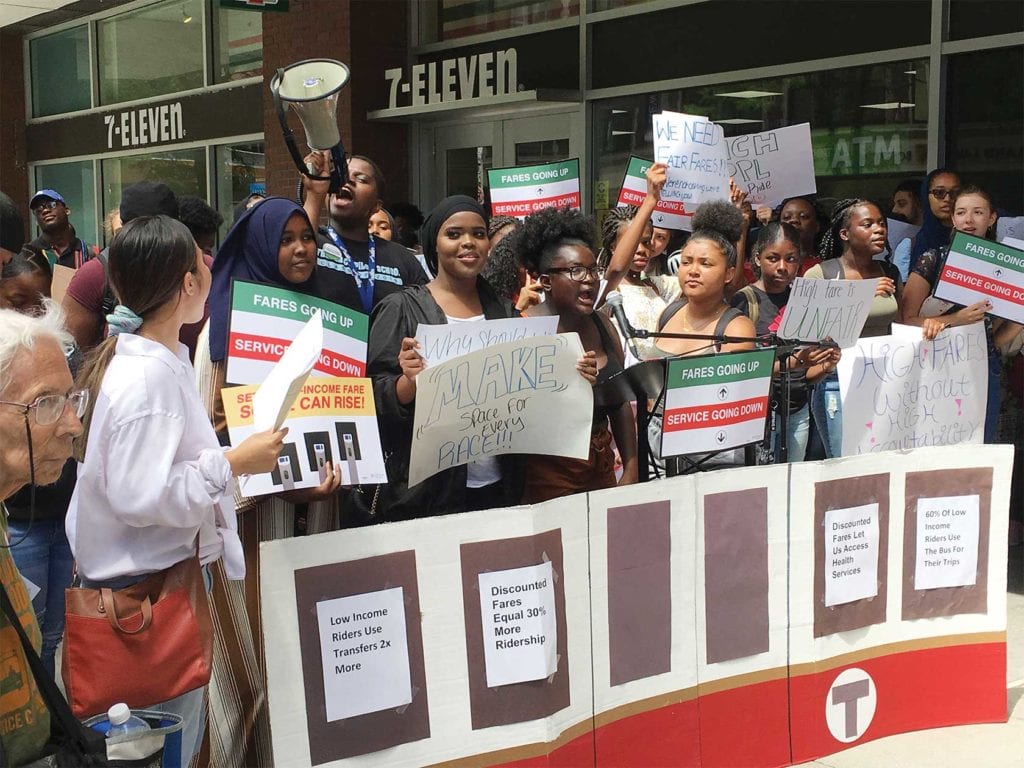
Community advocacy groups, including Community Labor United and The Green Justice Coalition, gathered outside the State Transportation Building Monday to demand a reduced-fare option for low-income riders of public transportation. Though the protest was held nearly a month after the MBTA increased fares on July 1, event organizers said they started planning the protest before the MBTA implemented the fare hikes.
The protest, which amassed more than 100 people, took place in advance of community organizers’ and residents’ testimony before the MBTA Fiscal and Management Control Board about the need for a reduced-fare option.
To highlight the issues low-income riders face on public transportation, low-income community members at a related press conference Monday discussed their experience riding and affording public transportation.
Chao-Ming Chen, a member of the Chinese Progressive Association, a grassroots policy advocacy organization, explained how the high cost of public transport limited opportunities for her family.
“I hope there [are] affordable, fair fares to put pressure off of working families like mine,” Chen said. “If I had a low-income fare, I would take the T more, save money, and have more resources for the future of my children.”
Angelica Veloz, a community organizer at Neighbor to Neighbor, read the statement of another organizer, Shakayla, who could not attend the protest due to inflexible work hours. Shakayla expressed her frustration with what she described as an expensive, unreliable and low-quality public transportation system.
“[The MBTA] expects us to pay these ridiculous prices, but can’t even have the decency to run on time, have AC, [or] heat during the corresponding months.”
Community Labor United’s proposal for a reduced-fares program for low-income riders would charge $30 for a monthly transportation pass, a rate equivalent to the current cost of youth passes in Massachusetts. The MBTA would automatically make the program available to individuals registered in a public benefit or job training program as well as riders whose incomes are either at or below 300 percent of the poverty level, a percentage equal to about $64,000 a year for a family of three.
Nicole Rodriguez, a Senior Researcher at Community Labor United and a key architect of the proposal, argued that the MBTA’s implementation of a reduced-fare option for low-income residents would increase both ridership and opportunities for low-income community members.
“A low-income fare would make the system more affordable and viable for low-income households, encouraging ridership of the MBTA, ultimately, transforming the MBTA into a pathway to opportunity, not the obstacle it currently is for lower-income people,” Rodriguez said.
Many attendees of the protest referred to a study that MIT published in June. The study measured the impact of a reduced-fare option on low-income riders’ relationship with public transportation. Low-income riders with a reduced-fare option took 30 percent more trips and traveled more frequently to receive health care and social services than low-income riders without reduced fares.
Boston at-large City Councilor Michelle Wu, who did not speak at the press conference but attended the protest, explained the impact of increased ridership from low-income residents.
“That’s a huge increase in that person’s and that family’s ability to access opportunity, to be financially stable, and to help reduce traffic and congestion,” Wu commented.
Darlene Lombos, executive director of Community Labor United, spoke to the Banner about the future pathway toward an equitable transportation system. Expressing concerns about a lack of community engagement in projects, Lombos argued that the MBTA must involve community members in the solution-building process.
“Our position is that nothing actually gets solved unless the people who are directly impacted are the ones that are a part of the solution,” Lombos said. “The Control Board, but also the MBTA management board, needs to work with us because we’re the ones with the solutions.”
After hearing the testimonies of community organizers and members, the MBTA Fiscal and Management Control Board has promised to look into the feasibility of a reduced-fare option.






